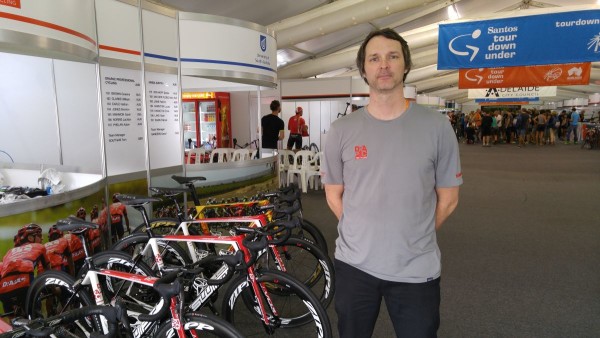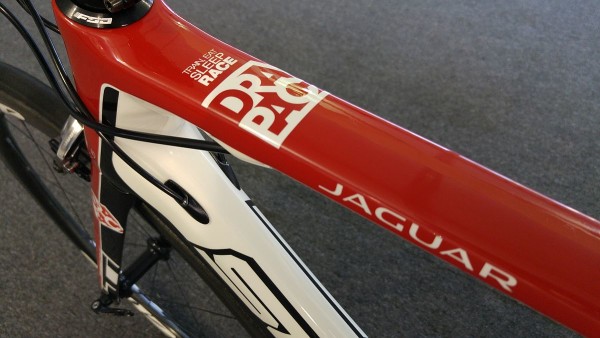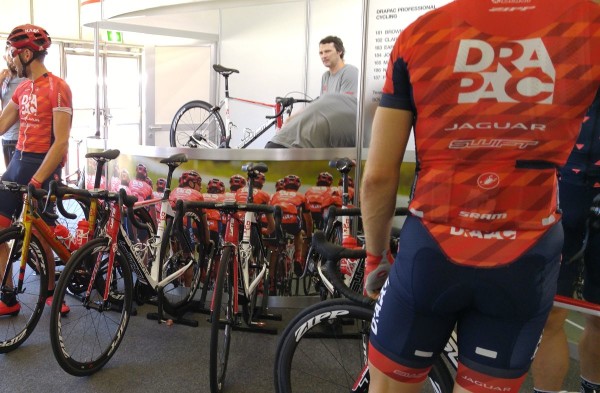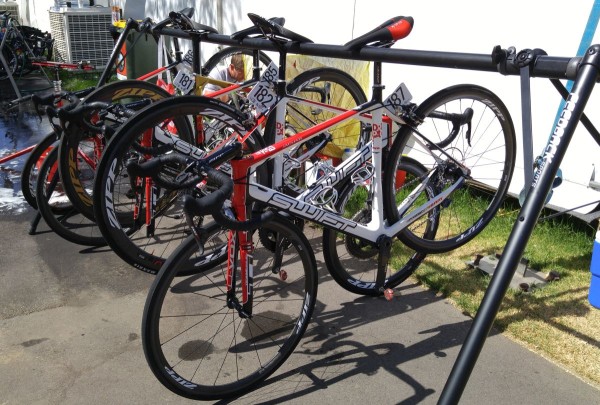Not too many pro-mechanics can say they have a tool named after them. But Jeff Crombie isn’t the sort of guy to brag about that. Jeff has been a mechanic for 12 years, and is currently freelancing for Drapac Professional Cycling at the 2016 Tour Down Under in Adelaide, South Australia. Graeme Brown’s race bike is one of the many Jeff has been working on before and during the race.
Based in North America, specifically Canada, Jeff has worked for the likes of SpiderTech, Team Sky, Orica-GreenEDGE and Drapac Professional Cycling. Fortunately for Drapac, the team is based in Melbourne, Australia, negating the logistical challenges that face the European-based teams visiting the Southern Hemisphere race. Regardless, Drapac’s mechanics still face the same challenges. We asked Jeff some questions about bikes and how he keeps them running smooth. Here’s his answers…
BIKERUMOR: How do you like the Tour Down Under?
JEFF: This is my second time at the race, it is the best. It is the best because of simple reasons. I like cycling and I’d like it to continue. One of the better ways to do that, is to give people accessibility. For example, if I wanted to sponsor a team, and I wanted to send my executives to look at my investment, I have to send them to a bad hotel, fifty miles out of town? In a parking lot? For the Tour Down Under, the public can easily access the race, both on the courses and here in the Tour Village (ed: which resides in the center of Adelaide). For other races, it’s like, want to come to the parking lot?
The model that the Tour Down Under presents is the direction cycling needs to go. People are accustomed to thinking of sports in a certain way. For example, everyone knows Cristiano Ronaldo’s number, everyone knows Kobe Bryant’s number. You know what team Chris Froome races for, but you’ll never know what race he is at – unless you know – and even in that race, his number is usually different. Races like the Tour Down Under bridge that gap, getting people to understand so ideally, you can get sponsors and keep the fans happy. Definitely a more sustainable approach.
Besides the race being good, the roads are great and the courses are a perfect balance for this time of year with shorter stages.
BIKERUMOR: For the Tour Down Under, do you make any special preparations for the race bikes?
JEFF: With the weather generally being good, and no cobblestones or exceptionally steep climbs to worry about, the drivetrains are typically 53 / 39 for chainrings and 11-28 for cassettes.
BIKERUMOR: For inclement weather, are there any special preparations you make for the bike?
JEFF: The most important thing is tire pressure, which is lowered for bad weather. The exact pressure will depend on the rider, so we adjust accordingly based on rider weight. However, if I were to quote an average, it would be around 105 – 110psi. If we are expecting a very bad day, I will apply a thin layer of grease to the chain atop the lube, to help repel water.
BIKERUMOR: What are you thoughts on road tubeless?
JEFF: I love it! – for me personally. I adopted the technology for my own bikes when Hutchinson released the tires to market several years ago. I use tubeless on all of my road and cyclocross bikes. From a consumer point of view, there are a lot benefits assuming people get into the mindset of treating the bike like your car. What I mean is, about 15% of people can fix their own flats and change their own tires, whereas 70% – 80% cannot.
With the bike industry there’s a lot of do-it-yourself which is good, but as technology increases, you cannot always apply that mindset. People may think, ten years ago, I could fix my own bike, ten years ago I could fix my computer. Not so easy now. If the bicycle industry does a good job of talking about the benefits of the technology, but at the same time promotes the services you’ll need from a local bike shop, that can only be a good thing.
BIKERUMOR: What are you thoughts on road disc brakes in the pro peloton?
JEFF: It should be interesting. I don’t know if it’s a solution to a problem that didn’t exist. Structurally and mechanically, a wheel is only designed to distribute load, but inadvertently we’ve ended up with a braking surface on the rim. In a race environment, where you have teams with large budgets and big name riders, it can be problematic where a rider could lose big time during a routine mechanical operation. Case in point is the time Cadel Evans lost during a wheel change at the 2009 Vuelta a Espana.
For racing, it will definitely change how things are done. As an example, for a disc brake wheel change, the rotor may not align with the caliper. Mechanics will take the time to do it properly, but only as long as it works. If a mechanic takes the time, and fifty percent of the time the rotor rubs the caliper, then we have a problem. Something else to think about, what is neutral support going to do? Integrating the technology in a consistent manner throughout the peloton is going to present a huge challenge.
Much of this comes down to friction on the road. Racers crash and washout, because their tires lose traction, not because a brake pad has worn through a rim in the race. From a consumer point of view, disc brakes on a road bike are fantastic – designated braking surface, far more consistency.
BIKERUMOR: What do you think about the UCI’s plan to possibly scrap the 6.8kg weight limit on bikes?
JEFF: About time! From what I understand about the history of that rule, people were going crazy with stuff such as trying to manufacture a 400 gram frame, which doesn’t work; it implodes. We have big name bicycle companies who sponsor teams and who sell to regular people, making safe bikes. It seems odd the UCI is dictating terms in a downward manner. David Brailsford of Team Sky isn’t going to risk Chris Froome’s life to save 150 grams. Nobody is going to take that sort of chance.
BIKERUMOR: If you could make improvements to a bicycle, what would it be?
JEFF: I would like a way to measure saddles properly, in terms of compensating for the flex, in a racing context. For example, you have a rider’s race bike, his spare bike and his home bike. Despite the bike being the same model, they all flex differently. If I gave you 50 pairs of Nike shoes in your size, not all 50 are going to feel the same. We spend a lot of time measuring the bike, but it is static. We need to figure out a method to load the bike with a weight simulating a rider, to figure out the flex.
The same issue is present for cleats. We measure to the outside of the shoe, and we can measure to more accuracy than the shoe is made – there are many variables. We try to measure so the riders avoid getting injuries. Again, even if the shoe is the same model, or even it was made on the same day, it’s never going to be exactly the same. Many riders notice these differences, especially with the huge numbers of kilometers they are riding.
BIKERUMOR: Is there a favorite rider you have worked with?
JEFF: I freelanced with Team Sky at the Tour of Colorado after Chris Froome won the Tour de France, it was his first race back. I’ve never had anyone say thank you while getting bottles from the car for his teammates. Chris is a very pleasant guy, and smart to conduct himself in this manner. Likewise, everyone I’ve worked with on the team has been very nice.
I’ve seen a lot of young guys, who think the way to be successful is to win everything. If you look at any sport, only one person can win. In a team, only one guy wins, and that team is against everyone else. If you want a career in cycling, you’re better off being a really good listener, a really good guy to work with, and put your nose to the grindstone. If you do that, other riders will notice.
I’m not trying to generalize here against North America. When the WorldTour teams come to the United States for the Tour of Colorado and Tour of Utah, a lot of the domestic teams don’t seem to work as much. They think, “well, you’re the WorldTour guys, so we’re going to wait”. But how many people get a chance to place on their resume, say being in a breakaway with Peter Sagan? Even if you blow up, everyone goes to dinner that night and all of the Sports Directors say, “Did you see that kid out there today? He killed himself trying”. The domestic riders may not beat the WorldTour riders, but you may as well work hard.
BIKERUMOR: Final question. Any special tips for bike setup?
JEFF: I never listen to music when I work – I listen. I’ve caught a few things like… what’s that noise?
Never getting complacent. That is an easy trap to fall into, doing the same thing day in and day out. I normally switch how I work on a bike. Front to back one day, back to front the next day. You’re still doing the same things, but in enough of a way that you have to think.
BIKERUMOR: Jeff, thank you for your time today.
JEFF: You are welcome.
Photos and interview by Gravel Cyclist.
Jayson O’Mahoney is the Gravel Cyclist: A website about the Gravel Cycling Experience.



